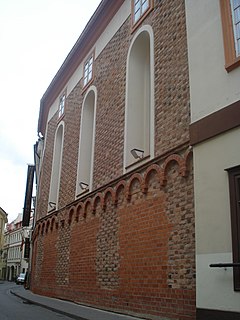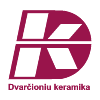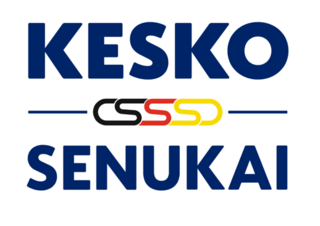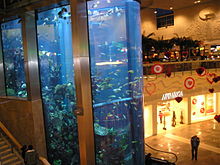
Lithuania, officially the Republic of Lithuania, is a country in the Baltic region of Europe. It is one of three Baltic states and lies on the eastern shore of the Baltic Sea. Lithuania shares land borders with Latvia to the north, Belarus to the east and south, Poland to the south, and Russia to the southwest. It has a maritime border with Sweden to the west on the Baltic Sea. Lithuania covers an area of 65,300 km2 (25,200 sq mi), with a population of 2.8 million. Its capital and largest city is Vilnius; other major cities are Kaunas and Klaipėda. Lithuanians belong to the ethno-linguistic group of the Balts and speak Lithuanian, one of only a few living Baltic languages.

Kurier Wileński is the main Polish-language newspaper in Lithuania. Printed in Vilnius, it is the only Polish-language daily newspaper published east of Poland. A direct descendant of both the 19th-century newspaper of the same name and the Czerwony Sztandar newspaper, created by the Soviet authorities in 1953 as a means of Sovietization of the Polish diaspora left in the Polish areas annexed by the Soviet Union. The newspaper is a member of the European Association of Daily Newspapers in Minority and Regional Languages (MIDAS). According to TNS Gallup media research, Kurier Wileński 36,800 people or 1.4% of Lithuania's population read at least one issue out of the last six in summer 2008, but that measure dropped to 0.3% in spring 2010.

Several Soviet OMON assaults on Lithuanian border posts occurred in 1991, after Lithuania declared its independence from the Soviet Union on 11 March 1990. As a Soviet republic, the Lithuanian SSR did not have a state border with customs or checkpoints. The newly declared Republic of Lithuania began establishing the State Border Guard Service, before it was internationally recognized on 27 August 1991 by the states of the European Community. These posts also became a symbol of its struggle for independence. The Soviet government viewed the customs posts as illegal and sent the OMON troops to harass the posts, especially those along the eastern border with Belarus. The unarmed custom officers and armed policemen were intimidated, beaten or killed, their cars were stolen or bombed, the posts were burned down or wrecked, and work of the checkpoints was otherwise disrupted. Two of the incidents resulted in the deaths of a total of eight Lithuanian citizens. In total, about 60 officers were attacked and injured, and 23 border posts were burned or destroyed.
Delfi is a major news website in Estonia, Latvia, and Lithuania providing daily news, ranging from gardening to politics. It ranks as one of the most popular websites among Baltic users.

Lesbian, gay, bisexual and transgender (LGBT) people in Lithuania face legal and social challenges not experienced by non-LGBT citizens. Both male and female same-sex sexual activity is legal in Lithuania, but neither civil same-sex partnership nor same-sex marriage is available, meaning that there is no legal recognition of same sex couples, so LGBT people do not enjoy all of the rights that non-LGBT people have, and same sex couples in the country do not enjoy the same legal recognition that is given to opposite sex couples. Although homosexuality was decriminalised in 1993, the historic legacy has only resulted in rights for LGBT people that are limited at best. Protection against discrimination was legislated for as part of the criteria for European Union accession and in 2010 the first gay pride parade took place in Vilnius.

Vilniaus prekyba - the largest Lithuanian group of private companies operating since 1992, with 44,000 employees in six countries.

The German Oceanographic Museum, also called the Museum for Oceanography and Fisheries, Aquarium, in the Hanseatic town of Stralsund, is a museum in which maritime and oceanographic exhibitions are displayed. It is the most visited museum in North Germany. In addition to the main museum building, the actual Oceanographic Museum, there are three other sites, the Ozeaneum, opened in July 2008, the Nautineum and the Natureum.

Maxima Grupė UAB is a Lithuanian group of retail chain companies operating in Lithuania, Latvia, Estonia, Poland and Bulgaria. It is the largest Lithuanian capital company and the largest employer in the Baltic states. As of 2020 Maxima has more than 1300 stores in Lithuania, Latvia, Estonia, Poland and Bulgaria. Each store offers between 3,000 and 65,000 brands, depending on the size of the store. The group employs more than 40,000 people. Its main headquarters are in Vilnius, Lithuania.

Žalgiris Arena is a multi-purpose indoor arena in the New Town of Kaunas, Lithuania. The arena is located on an island of the Nemunas River and is the largest indoor arena in the Baltics. The arena's maximum possible seating capacity for basketball games is 15,450, and 20,000 spectators for concerts. The Žalgiris Arena replaced the Kaunas Sports Hall as a major venue in the city.
The Kaunas Museum for the Blind in Kaunas, Lithuania opened in 2005. It was the first museum for the blind in the Baltic States and one of the first in Eastern Europe.

The Genocide and Resistance Research Centre of Lithuania is a state-funded research institute in Lithuania dedicated to "the study of genocide, crimes against humanity, and war crimes in Lithuania; the study of the persecution of local residents by occupying regimes; the study of armed and unarmed resistance to occupying regimes; the initiation of the legal evaluation of the activities of the organisers and implementers of genocide; and the commemoration of freedom fighters and genocide victims." The centre was founded on 25 October 1992 by the Supreme Council of the Lithuanian Republic as the "State Genocide Research Centre of Lithuania". It is a member organisation of the Platform of European Memory and Conscience.

Dvarčionių keramika is a ceramics tile producer in Lithuania and the largest ceramics producer in the Baltic states. It used to be traded on the NASDAQ OMX Vilnius exchange.

Lithuania Tribune is an online news portal providing news about Lithuania in English. It caters to foreigners with business and diplomatic interests in Lithuania, as well as the Lithuanian diaspora.
Danas Andriulionis is a Lithuanian painter and a member of the Lithuanian Artists' Association. He studied in Pakruojis, and graduated Rokiškis T. Vaižgantas school. In 1975, he joined the VISI, specialising in architecture, and in 1979 graduated from the Vilnius Art Academy, in the specialty of art designer. Since 2001, he has been a teacher of painting composition.

Kesko Senukai is a group of companies which runs the largest retail chain of do-it-yourself, house building, home repairing and improvement stores in the Baltics. Kesko Senukai is one of the largest companies in Lithuania engaged in retailing, wholesaling, and online trade. It also offers building repair, interior design, electronics, gardening, leisure, real commercial asset management, energy, financial, tourism, and recreation services and goods.

Akropolis is the largest shopping mall in the Baltics by floor area, a shopping center and entertainment center in Vilnius, the Lithuanian capital. It was built in Šeškinė by Akropolis Group in 2002 and opened in April 2002. The bank "Hansa-LTB" financed the construction. The authors of the project "Akropolis" were architects Gediminas Jurevičius and Algimantas Nasvytis from Vilnius. Interior project author was designer Unko Kunnap (Estonia).

Akropolis is a shopping center in Kaunas and the fourth largest shopping mall in Lithuania 81,000 m2. It was built by the Lithuanian company AB "Akropolis Group" in 2007. It was built near the river Nemunas. It is located near to the river and Žalgirio Arena. On the west side of the building there is a four-level free car park, the fourth floor of which can be reached by car as a viewpoint.

Prekybos miestelis Urmas is the third largest marketplace in the Lithuania 90,000 m2. Urmas is in Kaunas. It was built in 1992 and is managed by Lithuanian company UAB "Prekybos miestelis URMAS“. Urmas has over 2000 several shops. Many individual sellers. Urmas is more of a traditional marketplace than shopping mall.
















